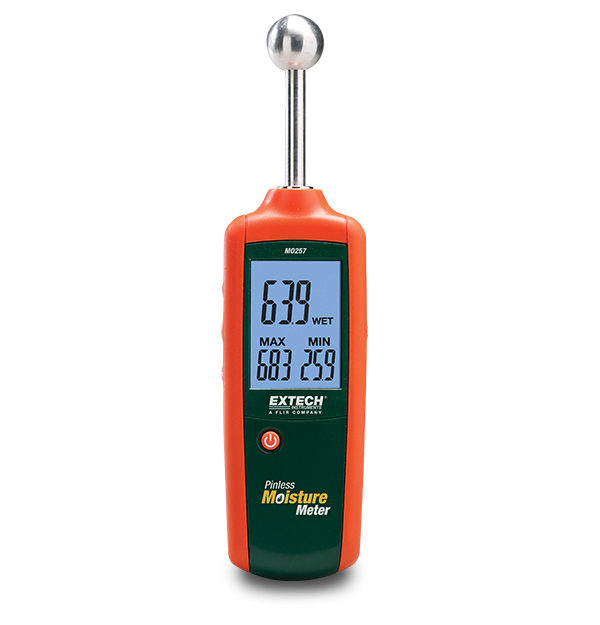Why Every Home Owner Requirements a Moisture Meter: Trick Advantages and Functions
Why Every Home Owner Requirements a Moisture Meter: Trick Advantages and Functions
Blog Article
The Ultimate Overview to Dampness Meters: A Comprehensive Introduction and How They Can Conserve You Cash
In the realm of building upkeep, building, and different industries, the importance of properly gauging dampness degrees can not be overemphasized. Wetness meters function as essential devices in identifying and checking moisture material in materials, assisting in avoiding pricey damages and ensuring the top quality of products. Recognizing the nuances of different kinds of moisture meters, their applications, and the prospective cost-saving benefits they supply can be a game-changer for experts and services alike. Discovering exactly how these devices can not just streamline procedures but likewise contribute to economic cost savings is a trip worth beginning on.
Kinds Of Moisture Meters
Different kinds of wetness meters are readily available for various applications in various industries. One common type is the pin-type wetness meter, which determines the electric resistance in between 2 pins put right into a product. This type is appropriate for wood, drywall, and other building materials. Pinless wetness meters, on the various other hand, usage electro-magnetic sensing unit plates to check a bigger location without creating damages to the product's surface area. Moisture Meter. These meters are ideal for rapidly examining dampness degrees in huge locations such as floors and walls.

Infrared moisture meters determine the thermal homes of a product to identify its dampness content non-invasively, making them beneficial for applications where pin or pinless meters might not be appropriate. Understanding the various types of moisture meters readily available can help sectors choose the most ideal device for their specific moisture dimension demands.

Advantages of Using Moisture Meters
Wetness meters offer indispensable advantages in accurately checking and examining wetness degrees in diverse products and settings. One of the key advantages of utilizing moisture meters is the prevention of possible damages triggered by excess moisture.
Additionally, making use of wetness meters can result in enhanced power effectiveness. By determining areas with high dampness levels, such as leakages or inadequate insulation, modifications can be made to improve power conservation and reduce energy costs. In farming settings, moisture meters play an essential duty in enhancing crop returns by allowing farmers to monitor dirt wetness degrees and make notified irrigation choices. On the whole, the advantages of using dampness meters cover across different industries, giving cost-efficient options and advertising better quality assurance methods.
How to Choose the Right Dampness Meter
When choosing a moisture meter, it's necessary to make certain that the meter is ideal for the specific product you will certainly be screening. Different materials have varying electrical homes that can affect moisture analyses, so picking a meter made for your product is important for accurate outcomes. By carefully evaluating these variables, you can select a wetness meter that meets your demands and supplies precise moisture dimensions for your jobs.
Appropriate Strategies for Dampness Meter Use

Cost Savings Through Moisture Meter Applications
How can the tactical use of wetness meters lead to considerable price financial savings throughout numerous industries? Wetness meters play a critical role in cost savings by protecting against possible damages and guaranteeing quality assurance in various industries. In the agriculture sector, dampness meters aid in identifying the ideal time for harvesting crops, preventing over-drying or excess dampness that can influence the end product's top quality. This exact monitoring aids farmers prevent unnecessary losses and optimize their yield.
In a similar way, in building, dampness meters assist prevent expensive problems by identifying moisture degrees in structure materials, such as wood or concrete, which can bring about structural problems otherwise dealt with promptly. By identifying trouble areas at an early stage, service providers can take corrective procedures to stay clear of comprehensive repair services or substitutes, ultimately conserving blog here money and time.
Additionally, in the food processing market, wetness meters are crucial for keeping track of item top quality and making certain compliance with security guidelines. By properly measuring moisture content in food products, makers can protect against spoilage, preserve freshness, and lower waste, causing substantial cost savings. Overall, the calculated application of wetness meters is a useful financial investment that can bring about significant price decreases and boosted performance throughout numerous sectors.
Verdict
In verdict, wetness meters are useful devices for determining and detecting moisture degrees in different products. By making use of the best wetness meter and following proper strategies, individuals can properly avoid costly problems caused by excess dampness.
Wetness meters serve as vital tools in identifying and keeping track of moisture material in materials, assisting in stopping costly problems and making certain the high quality of items. Infrared wetness meters determine the this page thermal buildings of a material to establish its dampness material non-invasively, making them beneficial for applications where pin or pinless meters might not be appropriate.Dampness meters use invaluable advantages in precisely keeping track of and examining dampness levels in diverse materials and atmospheres. In agricultural settings, moisture meters play a vital duty in maximizing plant yields by enabling farmers to keep track of soil wetness levels and make notified irrigation decisions.In final thought, wetness meters are beneficial devices for measuring and spotting wetness levels in different materials.
Report this page